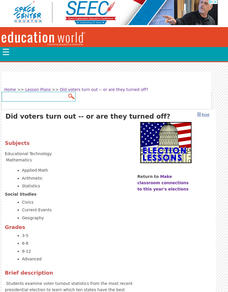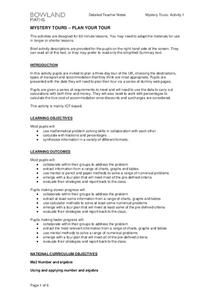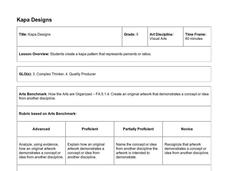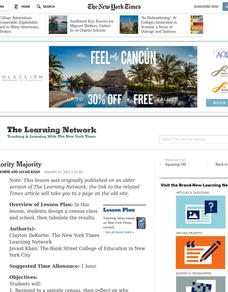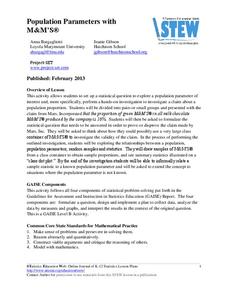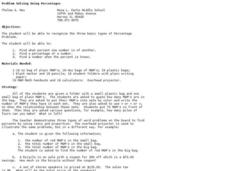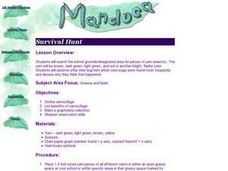Curated OER
Valentine Marbles
if you've ever had to guess how many items were in a jar, then this problem is for you! With a big jar full of red and white marbles, does picking a sample of 16 allow your learners to get a good estimate on the percentages of each...
Curated OER
Did Voters Turn Out -- or Are They Turned Off?
What was the voter turnout at your last state election? Examine voter turnout statistics from the most recent election to learn which ten states have the best turnout record. This lesson offers election data, handouts, and worksheets.
Curated OER
Integrating Gandhian Principles of Communal Unity in Mathematics
Fourth through sixth graders incorporate Gandhian principles into Math curriculum. They explore Gandhi's teachings on communal unity and economic equality. This has quite a bit of information about Gandhi and his observations and...
Curated OER
What's in a Number? Analyzing Smoking Statistics
Sixth and seventh graders analyze smoking statistics. In this health lesson, learners look at the percentage of people who smoke from each race group. They create a bar graph and circle graph that displays this information.
Bowland
Mystery Tours – Plan Your Tour
Everyone loves a vacation and a set of three activities has groups planning a tour of the U.K. using given distance, time, and price data. They solve a variety of problems related to the trip and produce a report on the success of the trip.
Hawaiʻi State Department of Education
Kapa Designs
I always knew there was a connection between art and math, and this lesson proves it. Fifth graders will use what they know about ratios and percents to design art inspired by Polynesian kapa cloth. A grid, specific guidelines, and the...
Curated OER
Measuring the Area of a Circle
When mathematical errors happen, part of the learning is to figure out how it affects the rest of your calculations. The activity has your mathematicians solving for the area of a circular pipe and taking into consideration any errors...
Curated OER
Rating Systems
Your favorite sports team is ranked #1. How do the powers that be determine this rating? Learn how ratings are mathematically computed using probability concepts, from the Elo Rating System for chess to the Rating Percentage Index for...
Curated OER
Common Procedure Costs
Kids never think about the cost of medical expenses, because they never think they'll get hurt. To better understand personal financial planning, learners research common medical procedures and their costs. They use a worksheet and the...
Curated OER
The Minority Majority
Students design a census class and school, then tabulate the results. They respond to a sample census, then reflect on why questions of race and national origin are different.
Curated OER
How Credit Card Interest Works
Learners experiment with an Excel spreadsheet model that demonstrates the effects of interest on payments. They calculate actual costs, interest paid, and time necessary to pay off credit purchases and draw conclusions about the...
Statistics Education Web
Population Parameter with M-and-M's
Manufacturers' claims may or may not be accurate, so proceed with caution. Here pupils use statistics to investigate the M&M's company's claim about the percentage of each color of candy in their packaging. Through the activity,...
Curated OER
Voter Turnout
Explore politics by analyzing the voting process. Pupils discuss the purpose of casting votes in an election, then examine graphs based on the data from a previously held election's turnout. The lesson concludes as they answer study...
Curated OER
The Art of Interpreting Percent
Ddefine the relationships between fractions, decimals, and percentages in a series of lessons. The class practices converting between these three versions of a number. They also find the common factor of a numerator and denominator and...
Curated OER
T Points from Directions
Here is a lesson that starts with having geometers translate points using compass directions into an accurate picture of the problem. Then they must use their knowledge of the Pythagorean theorem or similar triangles to solve. This makes...
Curated OER
Law of Large Numbers - Hospital
Students explore concepts of probability and independent events. They develop a formula for deviation percentage.
Curated OER
Finding Total Given Part and Percentage
Students observe models of fractional parts. After writing the definitions of percent, part and whole, students use the calculators and computers to solve problems. Individually, they complete assigned problems where the convert the...
Curated OER
Math: Football League Statistics
Students examine a soccer league final standings chart and then answer 12 questions based on the information provided. They calculate some answers in both fractions and percentages.
Curated OER
Problem Solving Using Percentages
Students explore the concept of percentages. In this percentages lesson plan, students find the percentages of various colored m&m's in their bags. Students find the cost of items before and after a discount. Students use proportions...
Curated OER
Number Patterns
An easy way to introduce numerical patterns, these activities can be made simpler by using addition, or more difficult with division, fractions, and percentages. Children examine patterns and determine the missing number in the sequence....
Curated OER
Survival Hunt
Students search for yarn representing insects on school grounds. They discuss which colors where found more frequently and why after the experiment. They use their math skills to determine percentages.
Virginia Department of Education
Rational Speed Matching
Ready, set, go! Individuals practice converting rational numbers between fractions, decimals, and percents. A speed game has teams match the three forms of rational numbers on a number line.
Curated OER
Return On Investment
Students engage in a lesson introducing them to the concept of return on investment, or ROI. Return on investment is a basic principle that should be understood before investing money.
Curated OER
Percents: What's the Use?
Students explore percentages in real world situations. In this percents lesson, students determine the final sales price after discounts. Students interview community members and determine how percentages are used in the real world.



